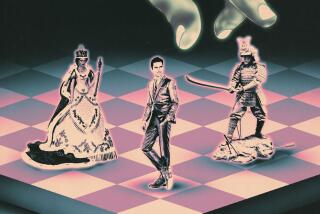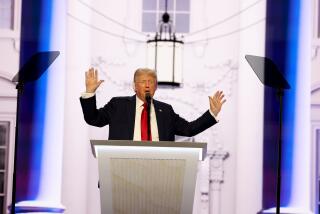Brokaw Does the Hat Trick: Gorbachev, Debate, Reagan
He was nimble. He was quick. He jumped over the candlestick.
What a week for NBC’s Tom Brokaw.
Last Monday night he was seen interviewing Soviet leader Mikhail S. Gorbachev in Moscow. The next night found him moderating that televised debate involving the Republican and Democratic candidates for President. Then on Thursday night he joined his anchor counterparts Dan Rather of CBS, Peter Jennings and Bernard Shaw of CNN in interviewing President Reagan.
Appropriately, they drew straws and Brokaw got the first question.
The trio of TV events demonstrated more vividly than ever the extraordinary evolution of the network anchor not merely as a celebrity but as a personage, a national leader, a V-V-VIP.
Even Walter Cronkite Himself never had such a week. When it had ended, you felt like addressing Brokaw as Your Anchorship .
Last Monday’s NBC promos hinted at what was to come:
“Tonight . . . Soviet leader Mikhail Gorbachev goes one-on-one with Tom Brokaw!” Side by side, in separate pictures, were Brokaw and Gorbachev as equals, an elevation of Brokaw to major-leader status.
The taped Gorbachev interview was one of those classic media exercises that would be repeated later in the week with Reagan in the Oval Office, one in which each side exploits the other. This time it was Gorbachev using NBC to hype this week’s summit, and NBC gaining from Gorbachev the prestige of a TV interview that was historic if not very newsy.
Once again, the process itself was significant, with Brokaw gaining exalted status seated at a small round table opposite the Soviet leader, although Gorbachev seemed able to shape the interview almost as he pleased.
When it was over, you wouldn’t have been surprised to hear NBC announce that next week Gorbachev would be interviewing Brokaw. If Tom could work him in.
“There are no more important issues in an election year than war and peace,” declared Brokaw the statesman at the start of the next evening’s two-hour presidential debate, which he moderated in prosecutorial style, pacing in front of the candidates, who were on a railed platform resembling a jury box.
The symbolism was significant. The candidates for President sat, Brokaw the authority figure stood. In fact, frequent cutaways and camera shots from over his shoulder--and the format itself--easily made him the evening’s most prominent figure.
Brokaw: “But let me ask you, Sen. Simon. . . .” Brokaw: “Would you vote for extra money, Congressman Kemp?” Brokaw: “Central America, Sen. Dole. You said. . . .” Brokaw: “We have a national epidemic in America called AIDS.” Brokaw: “It’s not easy running for President of the United States.”
Sometimes the candidates would answer questions by addressing him directly, as if competing for his vote: “Tom, we can all read our research. . . .” “Tom, George has rushed to. . . .”
There was one especially interesting moment when Brokaw asked the Democrats: “Who’s best equipped to sit across the table from Mikhail Gorbachev?” Although no one gave it, the correct answer was obvious, for we had all watched him do it the previous evening. The man who knew how to talk turkey with Gorbachev was standing right before them.
Tom Brokaw.
You won’t find anyone more masterful at his craft than Brokaw was during the debate. That he could concentrate at all--being freshly returned from the Soviet Union and having the coming Reagan interview on his mind as well--was remarkable. Under this enormous pressure, however, he still managed to be astute, incisive, quick and witty, and if he was being electronically fed questions or information from the control booth, it didn’t show.
So it was not Brokaw who failed, it was the process that he was part of--one that featured and celebrated him as much as it did the candidates, thereby helping eclipse them on a night that was supposed to be theirs, not the anchorman’s. You should come away from an evening like that recalling them, not him.
Not that television’s candidate debates have the right emphasis in any case. The trait most desired in a President in almost every instance--thoughtful contemplation of issues before making decisions--is exactly the one that is excluded from these TV debates. They are set up instead to reward human hair triggers--the quick, glib, hip-shooting response or sharp attack that brings laughter or puts an opponent on the defensive. We’re conditioned to believe that the candidate who pauses to think is the candidate who loses.
The question Thursday night was: Who won the interview?
Reagan set the agenda, but the Oval Office gathering was purely an anchor summit at which some of TV’s biggest stars loomed at least as large as the President.
It wasn’t because of anything Brokaw or Rather or Jennings did or said (CNN’s Shaw is still relatively obscure), only because they were there--and there together. You can never forget who they are--that they are intense, high-stakes competitors and hood ornaments for newscasts battling for Nielsens, that ratings points and millions of dollars may rest on each of their questions.
Brokaw went first, but Rather aggressively opened with a double-whammy: a Winston Churchill quote followed by a CBS News/New York Times poll. Reagan countered with a Russian proverb. Jennings briefly looked sensational in citing an ABC/Washington Post poll, but Reagan shot back with a poll of his own.
Armed with no polls or proverbs, Brokaw and Shaw were in big trouble.
Still, the interviewers were an impressive bunch. And at the conclusion of the 30-minute interview, it seemed to matter less whether a nuclear weapons treaty would be signed by the Soviet and American leaders than whether one would be signed by the anchormen.
It’s not only the White House that faces the burden of leadership.
More to Read
Get the L.A. Times Politics newsletter
Deeply reported insights into legislation, politics and policy from Sacramento, Washington and beyond. In your inbox three times per week.
You may occasionally receive promotional content from the Los Angeles Times.










